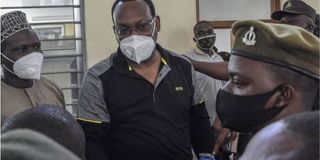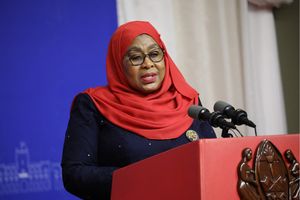The farce that was Mbowe’s case and lessons for the future

What you need to know:
- It still beggars belief that a country that always wishes to mirror itself as the paragon of civility and conviviality felt it necessary to bring terrorism charges against Mr Mbowe.
The biggest news in Tanzania last week was the release of opposition leader Freeman Aikaeli Mbowe after spending eight months behind bars on terrorism charges.
At the risk of sounding like a broken record, this column wades into the release of Mr Mbowe, whose time in prison ensured that Tanzania joined the list of other banana republics on the continent and elsewhere.
It still beggars belief that a country that always wishes to mirror itself as the paragon of civility and conviviality felt it necessary to bring terrorism charges against Mr Mbowe.
It beggars belief because by its very nature, politics – and opposition politics, for that matter – in the Third World is replete with the use of government security machinery to prevent “opposition goons” from even trying to attain power.
For some reason, at some point, someone felt that it was not enough to use police to disperse crowds, or deny Mr Mbowe and his colleagues the right enshrined in the Constitution to assemble and conduct political activities peacefully.
The powers that be came up with what they must have thought was a brilliant plan – arrest Mr Mbowe and a few acolytes, and charge them with terrorism.
The script was simple – terrorism is a serious crime punishable by harsh sentences in Tanzania, as is the case elsewhere.
What they did not contextualise was that the drafting of these charges was the easy part. In fact, the political neophytes that form part of the security machinery did not consider the end-game of Mr Mbowe’s arrest.
If they did, then they completely underestimated the backlash that would have accompanied the whole tragic affair even as they thought that they were winning a game of lottery against the Opposition.
Mr Mbowe’s arrest and trial quickly turned into a fiasco after it became apparent that the State had an embarrassingly feeble case against him and his co-accused.
It seems prosecution witnesses were hurriedly prepared, the case was incoherent, and even laymen could see that prosecution had no concrete case. Testimonies by prosecution witnesses were a complete farce, and that is putting it mildly. In the process, it was not Mr Mbowe who suffered serious damage.
It is the reputation of the United Republic of Tanzania that was drugged through the mud, and a country’s reputation, as we know, is not easily repaired after being tarnished they way it was.
Sometimes you really think that people who do things like this do so deliberately to sabotage somebody else. For them, politics is a game in which the end justifies the means.
Whoever was behind the politically instigated case against Mr Mbowe needs to be told in no uncertain terms that what they did was wrong, and it was Tanzania’s reputation that was seriously tarnished in the eyes of the international community.
The future of Tanzania is dependent on leaders, more so those in the ruling party, and all those eyeing political power in all its forms need to take into consideration the best interest of Tanzanians and the nation as a whole.
It is clear that there are forces that are detrimental to Tanzania’s common good, and the presidency should use its authority to scuttle any attempts to take the nation down a path of tragedy.
We have seen these things like detention without trial elsewhere just like we have seen the use of security agencies to stop free political activism. What else are we likely to see from these masters of the chessboard?




